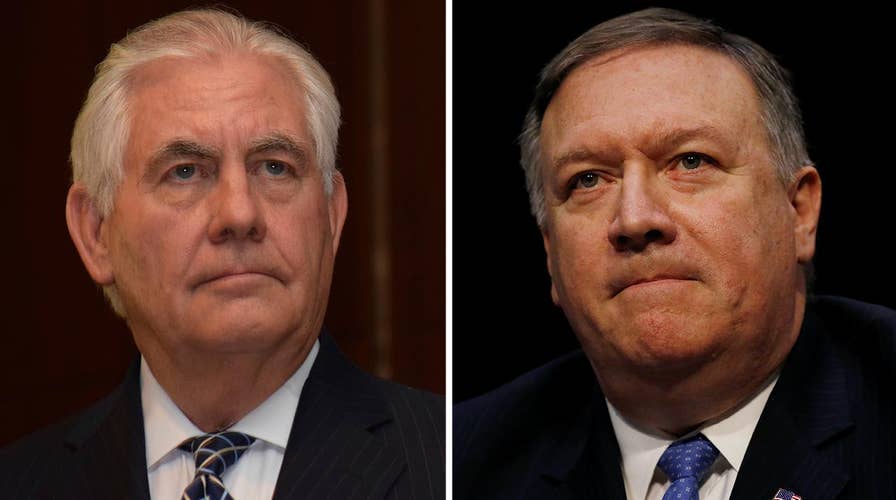President Trump to replace Tillerson with Pompeo
Rex Tillerson is out as secretary of state. Jonathan Swan of Axios provides insight into Pompeo's nomination.
President Trump acted correctly and decisively Tuesday by removing Secretary of State Rex Tillerson and announcing he will nominate CIA Director Mike Pompeo to become America’s top diplomat. And Gina Haspel, a career intelligence officer, is an excellent choice to replace Pompeo and become the first female director of the CIA.
That the president made these announcements by tweet is all the rage in the media. But President Reagan removed Alexander Haig as secretary of state in 1982 with similar speed, replacing him with George Schultz. President Reagan did not tweet – but neither did anyone else in the pre-Twitter age. Besides, there is more to this move than how it was announced, and that’s worth examining.
Why did President Trump fire Tillerson?
As an assistant secretary of state under President George W. Bush, and a White House staffer under Presidents George H.W. Bush and Reagan, my take is simple: President Trump sees dangerous waters ahead, and wants a seasoned captain to help him navigate these dicey straits, not a buttoned-down company man.
With a nod to Rex Tillerson’s steady stewardship for just over a year, the president let him go for two reasons.
First, Tillerson does not see the world as President Trump does, especially the complex array of opportunities for engagement associated with North Korea, Russia, China and Iran.
And second, while Tillerson was a choice who was out of the box, he did not think out of the box.
Pompeo represents the exact opposite. He is steeped in the intelligence, military and political sensitivities of North Korea, Russia, China and Iran – as big decisions loom.
The CIA director briefs President Trump regularly on all four of the above countries and the other most important national security issues. He is a former Army officer, a former member of Congress, and is highly sensitized to the domestic and international politics surrounding global issues.
Pompeo is also as smart as they come and will be one of the most creative thinkers ever to hold the post of secretary of state. He graduated at the top of his class at West Point, graduated from Harvard Law School (where he as editor of the Law Review) and was a lawyer at a top firm before moving into politics.
The president’s choice to become secretary of state is a perfect pilot for the rocky choke points of foreign policy that must be navigated. He will not let there be a misstep in the expected meeting between President Trump and North Korean dictator Kim Jong Un; count on him being there, and being crisp and quick to see around corners.
And Pompeo will neither ostracize nor indulge Russia. He has never gotten any awards from Putin, which Tillerson received when he was chairman and CEO of ExxonMobil.
Pompeo will be spring-loaded to help President Trump play trade cards with China to secure long-term security cooperation, and vice versa. He already gets along well with Secretary of Defense James Mattis and White House Chief of Staff John Kelly.
And as go-no-go decisions lie ahead in abiding or abandoning the Iran nuclear deal, Pompeo will offer sage advice, either justifying bold moves or guiding the process in the direction the president wants.
So replacing Tillerson with Pompeo is a sound move that will serve America well. Tillerson did his job methodically, but this is a good time for bringing another sort of captain up into the wheelhouse.
America needs – and the president needs – a creative, off-the-charts-smart, multifaceted and intelligence-savvy leader over at the State Department – someone with both political sensitivity and can-do management. That perfectly describes Mike Pompeo.
So as pundits look back and mutter on how “how it was done,” don’t bother focusing on that. The team at the State Department will be getting a star and the effect will be to make the president’s high-risk, high-reward game that much stronger.
The only people who need to sit up straighter, and probably will without delay, are the leaders of North Korea, Russia, China and Iran. Pompeo knows their game, knows our president, knows these dangerous waters, and will be as good a pilot for our foreign policy as any secretary of state in a dozen years, or maybe three dozen. His selection was a good and timely choice.

